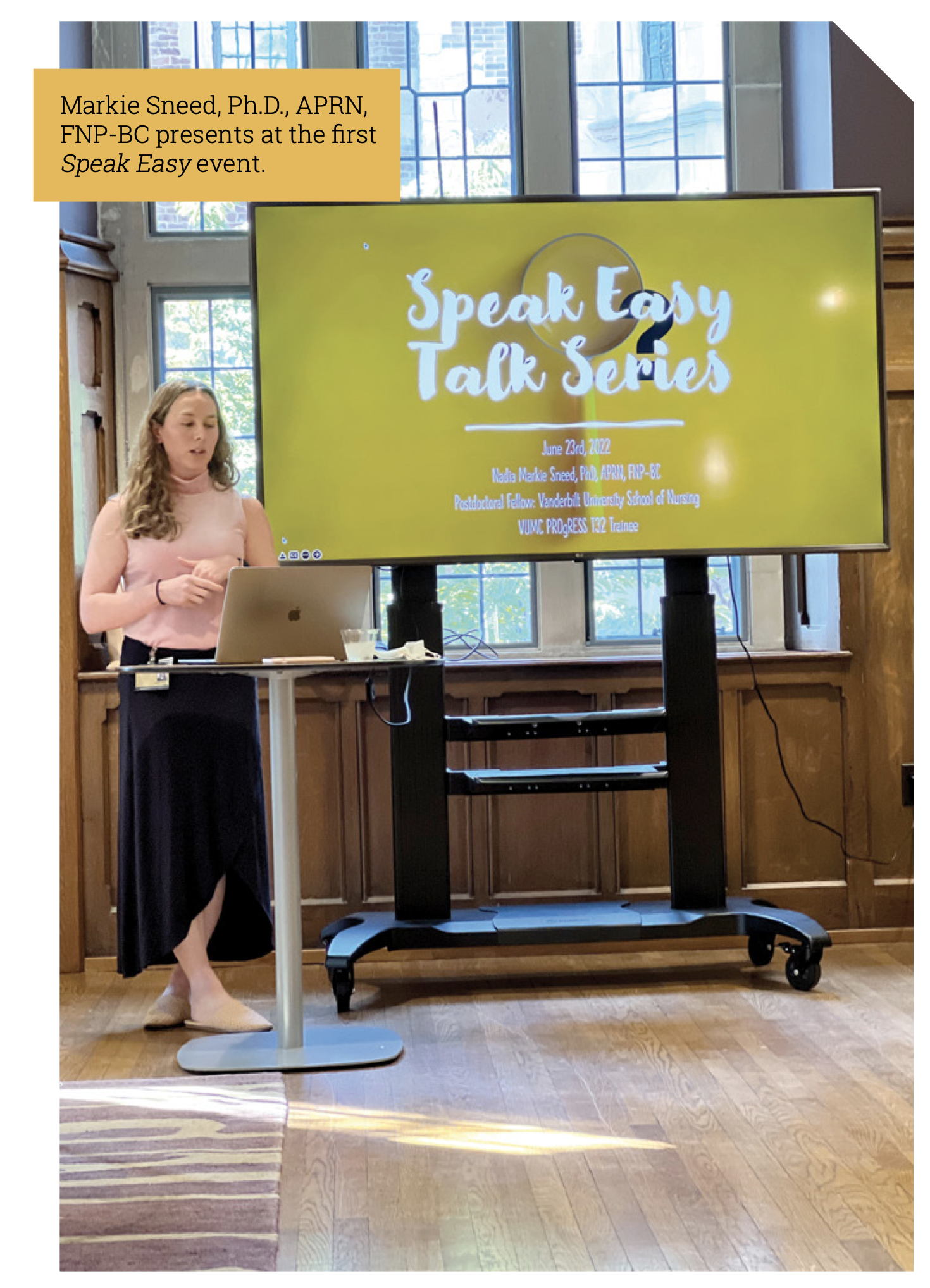Nadia Markie Sneed, PhD, is in her first year as a Postdoctoral Fellow at VUSN. Before Sneed became a nurse, she obtained her first bachelor’s degree in nutrition science from the University of Tennessee. Ever since, she has always made nutrition a key component of her clinical practice as both a bedside nurse and family nurse practitioner and also in her career as a nurse researcher.
 Sneed’s research aims to develop and test healthy diet patterns for families at high-risk for type 2 diabetes. Specifically, Sneed is interested in learning if adults with prediabetes and their children are interested in adopting a healthy “whole-foods” diet pattern that follows the Dietary Guidelines for Americans, 2020-2025 recommendations. These guidelines, updated every 5 years by the U.S. Departments of Agriculture and Health and Human Services , can help Americans achieve healthy eating while still implementing their personal, cultural and traditional preferences.1 Sneed claims her studies “are unique because we specifically utilize the Dietary Guidelines Framework [to create] menus that support a dietary pattern consisting of healthy, minimally processed whole foods such as fruits, vegetables and whole grains that are delivered to family’s doorsteps.”
Sneed’s research aims to develop and test healthy diet patterns for families at high-risk for type 2 diabetes. Specifically, Sneed is interested in learning if adults with prediabetes and their children are interested in adopting a healthy “whole-foods” diet pattern that follows the Dietary Guidelines for Americans, 2020-2025 recommendations. These guidelines, updated every 5 years by the U.S. Departments of Agriculture and Health and Human Services , can help Americans achieve healthy eating while still implementing their personal, cultural and traditional preferences.1 Sneed claims her studies “are unique because we specifically utilize the Dietary Guidelines Framework [to create] menus that support a dietary pattern consisting of healthy, minimally processed whole foods such as fruits, vegetables and whole grains that are delivered to family’s doorsteps.”
When asked about the importance of this research, Sneed states that “across the lifespan, we are seeing that more Americans are considered ‘metabolically sick’ than healthy due to an unprecedented rise in diet-preventable conditions such as obesity, heart disease and diabetes. In fact, over half of the U.S. population is living with either type 2 diabetes or prediabetes, which can be prevented with a healthy diet.” The CDC reports that about 34 million Americans live with type 2 diabetes and an additional 96 million American adults have prediabetes.2,3 Shockingly, over 80% of Americans with prediabetes don’t know they have it.2 Sneed also reveals that the rates among children with type 2 diabetes and prediabetes are on the rise with “currently 1 in 3 adolescents considered ‘high-risk for type 2 diabetes’ due to having prediabetes.”
So, what kind of diet should someone with prediabetes maintain? Unfortunately, there’s no clear-cut answer. “Health professionals do know that eating patterns which emphasize whole and minimally processed foods can protect against the development of type 2 diabetes,” Sneed tells us. However, that doesn’t translate as easily into an “optimal diet pattern,” which can be frustrating. Sneed explains that her passion for “identifying evidence-based strategies to help families adopt a healthy diet pattern that works for their individual needs and promotes health and wellness at all life stages” is a direct result of this.

Throughout the recruitment and study process, Sneed and her team have met numerous families from the Nashville metropolitan area who were genuinely interested and excited in creating, and then maintaining, healthy diet patterns for all members of the family. “Not only is it exciting to see adults in our study describe the changes they are continuing to implement at home, but it is even more exciting to hear the children in our studies talk about all the new foods they tried and liked. It is definitely a win-win in our fight against type 2 diabetes,” Sneed states.
Long-term, Sneed’s research aims to “identify an evidenced-based healthy dietary pattern that is not only family-friendly, but adaptable to meet the complex dietary needs of all families at risk for type 2 diabetes. Moreover, we hope to show that not only is diet an essential part of the ‘standard of care’ for diabetes prevention, but that food alone can be used as a non-pharmacological treatment for prediabetes and type 2 diabetes.” It’s important to note that not only can prediabetes be prevented, once diagnosed, it can be reversed.2 Sneed hopes that her research, along with those of others, will help Americans recognize the need to implement change in their diet patterns and prioritize fresh and whole foods. “It would be great if one day we see health care providers prescribing produce prescriptions that are covered at no cost by insurance.”
Sneed’s research is supported by a T32 training grant through the Agency for Healthcare Research and Quality (1T32HS026122), the Vanderbilt University School of Nursing, and the Vanderbilt Institute for Clinical and Translational Research (VICTR) which is funded by the National Center for Advancing Translational Sciences (NCATS) Clinical Translational Science Award (CTSA) Program, Award Number 5UL1TR002243-03. She would also like to acknowledge the members of her Scholarship Oversight Committee who have been instrumental in guiding her throughout her postdoctoral fellowship: William Heerman, MD, MPH; Mariann Piano, RN, PhD, FAAN, FAHA; Amy Goss, PhD, RD; Shelagh Mulvaney, PhD; and Christianne Roumie, MD, MPH.
References
- Current Dietary Guidelines. S. Department of Agriculture and U.S. Department of Health and Human Services. https://health.gov/our-work/nutrition-physical-activity/dietary-guidelines/current-dietary-guidelines. Accessed February 8, 2023.
- The surprising truth about prediabetes. Centers for Disease Control and Prevention. https://www.cdc.gov/diabetes/library/features/truth-about-prediabetes.html. Published July 7, 2022. Accessed February 8, 2023.
- Type 2 diabetes. Centers for Disease Control and Prevention. https://www.cdc.gov/diabetes/basics/type2.html. Published December 30, 2022. Accessed February 8, 2023.